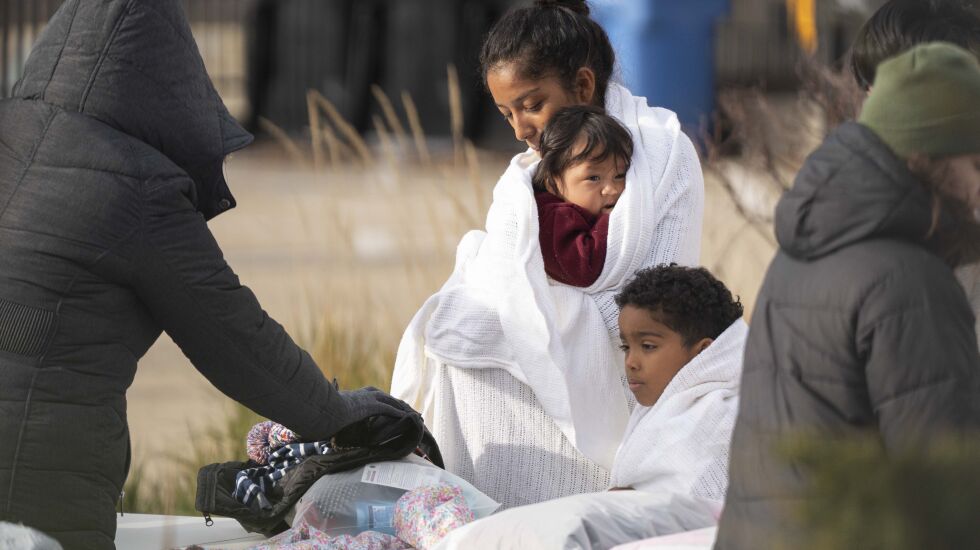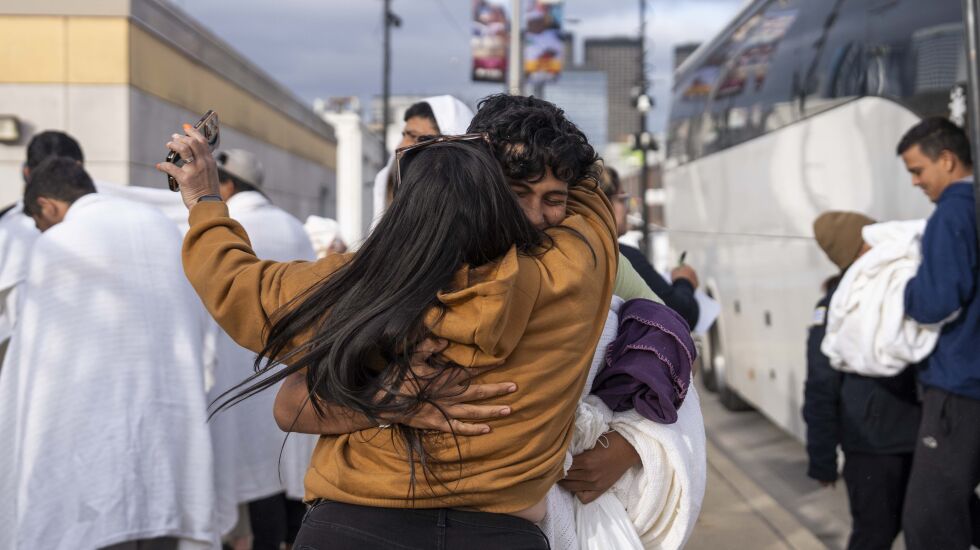
As Texas Gov. Greg Abbott continues skirting Chicago’s rules for buses ferrying migrants to the city by dropping off asylum-seekers in the suburbs, several municipalities are responding by passing measures of their own to limit or block arrivals.
The measures by surrounding municipalities include ordinances regulating or preventing bus drop-offs and taxes aimed at blocking the use of local hotels/motels as shelters and even symbolic “non-sanctuary” declarations.
The measures come as bus operators carrying migrants have begun dropping them off at train stations and other locations outside the city, and as Abbott has begun sending migrants in charter planes to the area.
The Texas governor’s new approach to sending migrants from the border to the city is in response to Mayor Brandon Johnson’s attempt to limit bus arrivals to regular weekday business hours.
The city and state have made a concerted effort to turn 800 S. Desplaines St. — the Maxwell Street Market — into its designated “landing zone” for migrant arrivals in order to ensure their smooth movement into city shelters or beyond Chicago.
As recently as Wednesday, the state announced construction of heated tents at the site for the dozens and sometimes hundreds of migrants who have found themselves waiting there for placement in city shelters.

Bus ordinances
Chicago enacted its bus ordinance in mid-November and began filing lawsuits against “rogue buses” by Nov. 29, according to a law department spokesperson. As of Wednesday, the city has cited nearly 100 buses and impounded two.
Bus operators have responded by bringing thousands of migrants to train stations outside the city, where they then catch rides bound for downtown, or even at highway pit stops.
DuPage County has had nearly 3,000 migrants pass through this way since mid-December, according to a statement by the county west of Chicago on Wednesday.
County officials said they would aim “to provide a secure and smooth transition for these new arrivals” to downtown Chicago, although some local municipalities are aiming to put a stop to the process altogether.
Kankakee, which saw a chaotic bus drop-off Dec. 22, passed an ordinance Tuesday evening, similar to Chicago’s and other surrounding municipalities, said Mayor Chris Curtis.
“What really concerned us was the bus driver dropped them off and told them they were in Chicago,” Curtis said. “It became a safety issue.”
Hinsdale — which, along with Wheaton received the most buses — approved an ordinance at a special meeting Tuesday to clamp down on bus arrivals.
In McHenry County, Woodstock approved a similar ordinance Tuesday, and the city of McHenry approved one Friday.

Hotel shelters
Since migrants began arriving in Chicago in 2022, the state of Illinois has provided shelter for many, off-and-on, at suburban hotels.
But several municipalities are aiming to clamp down on that.
Oak Lawn passed an ordinance Dec. 12 aimed at preventing that by taxing extended hotel and motel stays.
Schaumburg passed a similar measure Nov. 28.
Elk Grove Village passed a measure of its own in December, according to a village publication.
“In an effort to prevent long-term placement of migrants from staying in Elk Grove Village, the Village Board approved an ordinance that will require hotel and motels to verify that individuals who are not residents of the United States provide certified medical documentation to reserve overnight accommodations,” it reads.
“The documentation must state that the individual has not been diagnosed or contracted any contagious diseases in the past 60 days and must be from a board-certified infectious disease specialist.”
The requirement does not apply to those who have been in the U.S. for over a year.

‘Non-sanctuary’
Some municipalities have passed more symbolic resolutions in an effort to distance themselves from places like Chicago, which has its Welcoming City ordinance.
Grundy County approved a resolution Dec. 6 to declare itself a “non-sanctuary county.”
The resolution acknowledges Illinois is a sanctuary state, meaning local law enforcement is prohibited from participating in immigration enforcement operations.
But it’s aimed at signaling the county is “wanting and encouraging federal enforcement of immigration laws” in Grundy, according to the resolution.
La Salle County, west of Grundy, will likely consider passing a similar resolution at a Jan. 11 board meeting, according to reporting by Illinois Valley.
The county did not immediately return calls for comment.
Michael Loria is a staff reporter for the Chicago Sun-Times via Report for America, a not-for-profit journalism program that aims to bolster the paper’s coverage of communities on the South Side and West Side.







